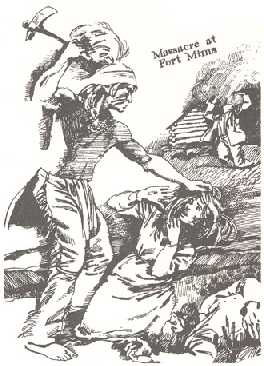Newcomb: Joseph Story and the 'right of discovery'The right of the Indians to their lands, [Supreme Court Justice] Story said, “could not be justly narrowed or extinguished without their own free consent.” Then, in a remarkable passage, Story wrote: “There is no doubt, that the Indian tribes, inhabiting this continent at the time of its discovery, maintained a claim to the exclusive possession and occupancy of the territory within their respective limits, as sovereigns and absolute proprietors of the soil. They acknowledged no obedience, or allegiance, or subordination to any foreign sovereign whatsoever; and as far as they have possessed the means, they have ever since asserted this plenary right of dominion, and yielded it up only when lost by the superior force of conquest, or transferred by voluntary cession.”
The Europeans, of course, held a view quite different than that of the Indians. From their prejudiced viewpoint, Story said, “The Indians were a savage race, sunk in the depths of ignorance and heathenism. If they might not be extirpated for their want of religion and just morals, they might be reclaimed from their errors. They were bound to yield to the superior genius of Europe, and in exchanging their wild and debasing habits, for civilization and Christianity they were deemed to gain more than an equivalent for every sacrifice and suffering.”And more:
In a later section of his book, a “General Review of the Colonies,” Story explained the religious basis upon which the United States refused to acknowledge Indian peoples as being entitled to a free and independent existence: “As infidels, heathens, and savages, they were not allowed to possess the prerogatives belonging to completely sovereign, independent nations.” The question remains: On what basis is this kind of thinking, which is also found in the Johnson v. M'Intosh decision, acceptable in U.S. law?Comment: Author Newcomb says America's basis for not acknowledging tribal sovereignty was religious. One could just as easily say the basis was cultural. Because Americans believed Indians were
savages, they didn't give them the rights accorded to other human beings.



1 comment:
GrEeTiNgS, www.bluecorncomics.com!
[url=https://launchpad.net/~fxnz ]Comprare Levitra generico[/url] [url=https://launchpad.net/~kzli ]Acquistare Kamagra in Italia[/url] [url=https://launchpad.net/~couv ]Comprare Propecia in Italia[/url] [url=https://launchpad.net/~qity ]Vendita Lasix generico[/url] [url=https://launchpad.net/~zyhb ]Vendita Tadalis-Sx in Italia[/url] [url=https://launchpad.net/~borss ]Acquisto Accutane generico[/url]
Post a Comment